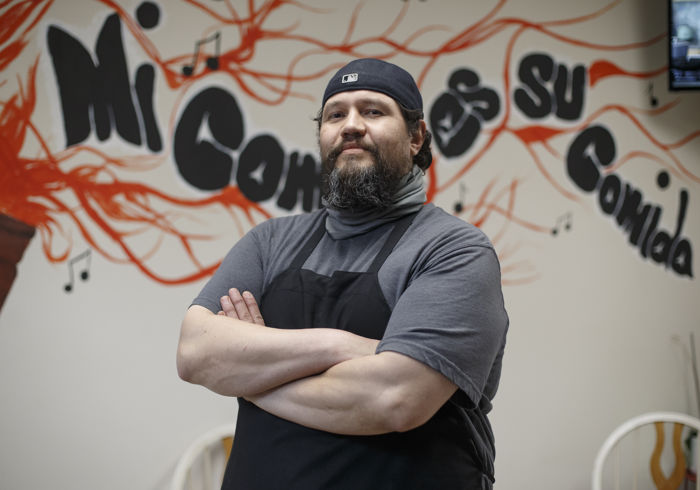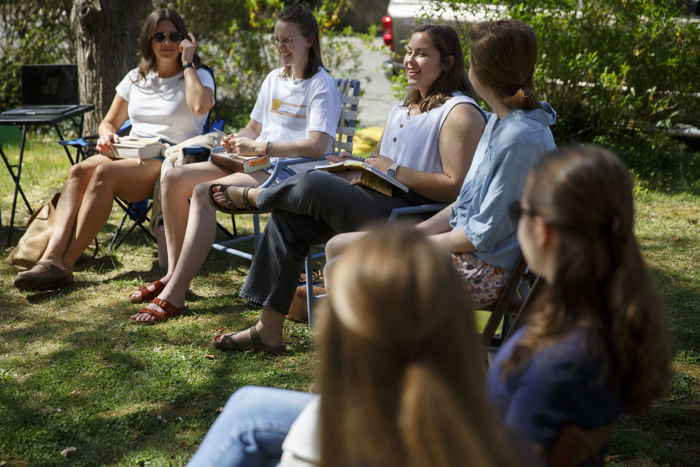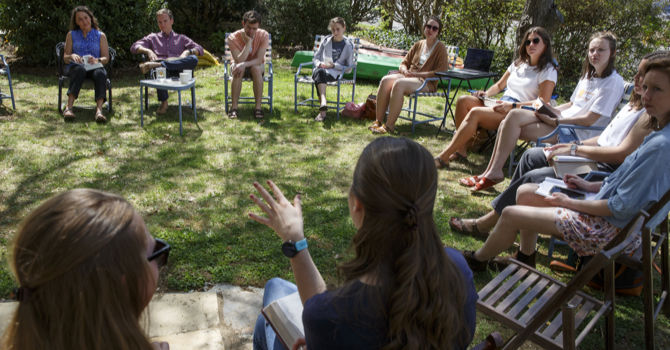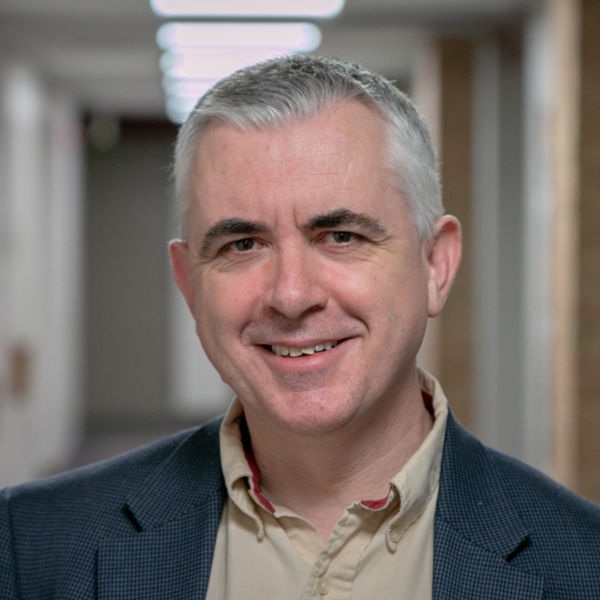When sanctuaries closed their doors in mid-March 2020 in an attempt to stem the spread of COVID-19, not everyone at The Center for Faith and Leadership, a student ministry at the University of Mary Washington, was ready to trade the communal worship experience for one delivered via Zoom. So a handful began gathering outdoors at the home of Gannon and Carey Sims, The Center’s co-directors, who live about a block from the small liberal arts campus.
Socially distanced on the couple’s back porch, they sang, testified and prayed for each other and their community. Rather than preach a sermon, the Simses led the group on a guided exploration of Scripture, one in which all present were encouraged to share the words or passages from the day’s reading that had moved them.
For Haley Randall, 24, who graduated from UMW last spring with a master’s in education, the participatory bent of those backyard gatherings was unlike any church service she’d ever attended.
“It was like the sermon was written right there in front of our eyes. Everyone had gotten something different from the scripture,” said Randall, a high school world history teacher in nearby Caroline County. “And everyone’s voice is valued. You are free to hear the voice of God as well, rather than listening to what God has said to somebody else.”
How does your organization cultivate the conditions for people to feel free to hear the voice of God?
Teaching young people how to develop healthy, supportive relationships with others while discerning God’s call is at the heart of everything the Simses have done since arriving at The Center nearly a decade ago.
Both Gannon and Carey are employed by the Baptist General Association of Virginia (BGAV), which owns the building -- a 4,800-square-foot home across the street from campus -- that houses The Center. But the Simses describe themselves as broadly ecumenical, and the word “Baptist” disappeared from the signage before the Simses arrived in 2011.
The Center functions as more of an interdenominational Christian space, attracting everyone from Catholics and Eastern Orthodox to those who grew up unchurched.

A year after the experiment began as a temporary approach to worship during the pandemic, the Simses’ backyard gathering has expanded to include two additional lay-led home churches -- with two more in the pipeline -- where participants are invited to divine the word of God through meditation, contemplation and debate.
It’s more akin to an immersive spiritual experience than a religious lesson delivered by a clergy member, said Randall, who now co-leads one of those home churches. And because each home church is kept to between 12 and 18 people, there’s a level of intimacy and warmth that can be hard to duplicate in a larger, more traditional congregation, she said.
How does your congregation take church home with them? How is church a home for them?
“The key thing is being able to have real connections with real people. It’s not like you can just enter and exit without talking to anybody,” she said. “Church can be so much more than just sitting in a pew on Sunday. You can take it home with you. It can be home.”
‘What do you want me to do for you?’
Initially, Gannon and Carey Sims had intended to pursue ministry through other meaningful work. Carey, who has an MBA from Regent University, was nurturing a Christian ethic in her role as vice president of her family’s northern Virginia vintage furniture business.
And Gannon, a Baylor University graduate, was guided by that same principle in his posts on Capitol Hill, where he served as a legislative aide in several Senate offices before joining the public affairs staff of the State Department’s anti-human trafficking office.
After meeting in a young adults group at an Episcopal congregation in northern Virginia and then marrying in 2005, the couple began to feel called -- as a team -- to do more. Their friends urged them to attend seminary, and both graduated from Duke Divinity School in 2009.

Neither had much experience with campus ministry work when they arrived at The Center after their pastoral residencies in Dallas. But both knew they wanted to work with young people and do church planting, and The Center felt like a good place to start.
The Baptist General Association of Virginia hired Carey to lead the campus ministry and brought Gannon on as a member of its Fresh Expressions initiative, a movement that began in the United Kingdom as a way to introduce church and creative missional work to people who don’t generally affiliate with a faith community.
The Center embodies that same ethos. The couple’s work there is very much a labor of love: technically, Gannon isn’t paid for his campus ministry efforts, though he applies Fresh Expressions principles to his work with students. Carey receives a small yearly stipend from BGAV, but The Center is responsible for raising about 70% of its annual operating budget of about $60,000.
The BGAV gave the Simses pretty wide latitude in how they wanted to run The Center, which hadn’t had a full-time pastor in several years. Initially, the couple considered doing some church planting in the school’s dorms, but another ministry already had a strong presence on campus, and they didn’t want to duplicate efforts. They ultimately decided that the best way to find out what the community needed from The Center was to ask.

Carey references the Gospel story of how a blind beggar by the side of the road called out to Jesus as he traveled with his disciples near Jericho. Jesus responded, “What do you want me to do for you?” before honoring the man’s request to restore his sight.
“A lot of times, we don’t honor people with that question,” she said. “We tell them what we need from them, when we should be asking, ‘How can we come alongside who you are and who you’re becoming?’”
They started posing a version of that question to everyone they met.
Will Negron was managing a coffee shop near campus when Carey and Gannon stopped by for a caffeine fix. He and Gannon bonded over their shared love of Americanos, and after learning that Negron was working full time while carrying a full load of classes at Mary Washington, the Simses offered up The Center as a quiet place where he could study during the day.
Negron, who was also raising three children with wife Maria, said it became his favorite place to nap.
The Center organically became a place for others to use. How can you re-imagine your space to be open to others’ needs -- whether napping or meeting or eating or serving?
Meanwhile, FredXchange, a local nonprofit that supported budding entrepreneurs, had been meeting weekly in a private room in the coffee shop, but they had outgrown the space.
The Simses invited them to move those meetings to The Center. Sometimes, Negron said, he’d bring his wife and children to The Center’s weekly home-cooked dinner. And then one day, Negron, who had a budding entrepreneurial spirit of his own and a long history in food service, asked Carey if he might cook a meal for the students.
“I wanted to cook something the students weren’t getting,” said Negron, 44. “They’d had enough spaghetti dinners.”

Pretty soon, Negron was cooking dinner once a month for about 70 students at The Center, serving up shrimp and grits, fried green tomatoes, tacos with bulgogi, and dishes that celebrated his Puerto Rican heritage.
The Center paid for the ingredients, about $150 per meal, said Negron, and the experience helped him figure out how much food to buy for a crowd, how to serve up creative meals on a budget, and how to calculate portion sizes.
When he launched his catering business in 2017, The Center offered him the use of its kitchen and storage space until he leased a place of his own. He has since purchased a food truck and opened a takeout joint called Will’s Place, where customers can enjoy mouthwatering plates of slow-roasted pork, crispy empanadas and plantains -- with a side of coqui, a mayonnaise and ketchup-based sauce perfected at The Center.
Before the pandemic, he’d return to The Center each fall to welcome students back with a home-cooked dish.
“It’s about giving back and teaching people about different foods and coming to the table as one,” said Negron, who credits The Center with giving him an opportunity to live out his dream of owning a business. “The relationships we’ve formed there remind me there’s still hope with people in the world.”
One of The Center’s slogans is “Start Dreaming Again.”
How can your church or organization be a launching pad for others’ dreams?
“How can we use what we have to help launch what you’re dreaming?” Carey said. “We want to help nurture and call forth the natural gifts God gives everybody and give them a creative space to explore and try things. Let’s see how people make sense of their faith -- not just on Sunday, but how does their life become a testimony of what they believe?”
‘A spiritual potluck’
Emma Hammond, 21, said she felt an overwhelming sense of belonging the first time she attended a Monday night women’s Bible study group as a freshman. She was trying to adjust to her first year at Mary Washington, where she was also a volleyball player, while grieving the recent loss of her great-grandmother, a woman of faith who had encouraged Hammond to turn to God when troubled.
Even before the pandemic, Hammond, who is graduating from UMW this spring with a bachelor’s degree in English, said she started to feel that she wasn’t getting as much out of the traditional Sunday church experience as she once had.
“I’d sit in church and kind of feel lonely. I realized that I’d spent my whole week listening to my professors talking to me, preaching in a way, and I wanted to talk to my friends, see how everyone was doing and let them know how I was doing,” she said. “So I sort of slowly stopped going.”
As an alternative, she suggested that The Center offer “pancake church” on Sundays, where people could enjoy breakfast and conversation together.
Roughly two months later, when churches shut their doors to in-person worship, that’s essentially what the Simses hosted on their back porch -- albeit with liturgy and communion.

Like Randall, Hammond said the participatory nature of the service helped her process and grasp Scripture in a way she hadn’t before.
How is your church equipping young people to feel confident in their ability to lead?
As the crowd of worshippers in the Simses’ yard grew and the weather turned colder, the Simses moved some of the group into their home, while two regulars -- Randall and Fredericksburg native Gordon Wiss, 23 -- volunteered to lead a second home church in the living room of The Center, using a similar service model. A third group now meets in a home across the street from the Simses’.
Each Sunday morning, the two service facilitators (as they refer to themselves) posted at each home meet via Zoom with Carey and Gannon and choose readings from the Revised Common Lectionary. About an hour later, the in-person service itself opens with a psalm followed by a period of reflection and thanksgiving.
Then they explore the readings selected earlier that morning, using the Benedictine practice of lectio divina, or “divine reading.” Participants read the passage out loud four times, including once as a prayer and another as more of a meditation, before exploring the scripture’s meaning in a group discussion. Once a month, the home churches get together for a joint service and communion in The Center’s spacious living room.
Having two facilitators means that while one is leading a portion of the service, the other can sort of take the temperature of the room, making sure everyone’s voice is heard, said Randall. It helps, added Wiss, if the facilitators have complementary skills.
“Everybody has a different life experience, a different spiritual maturity, a different sensitivity to the Holy Spirit,” said Wiss, an engineering consultant. “All of us have these different points of view that we share with each other, and it’s like a spiritual potluck -- everybody has a dish to bring to the discussion.”
Wiss, whose mother was the Baptist campus minister at Mary Washington in the late ’90s, said he misses the traditional sanctuary experience and hopes to see that restored post-pandemic. But he also noted that home church allows for tremendous spiritual growth among participants and appeals to those who aren’t comfortable going to church.
For clergy, the worship style is “a lesson in getting over yourself,” said Gannon, because it’s more of a collective, lay-led experience. He’s working on a book through Fresh Expressions to help guide other communities interested in pursuing home church, either as a primary approach to worship or as a supplement to traditional church services.
“I believe in highly portable, low-maintenance ways of doing church,” he said, adding that success isn’t measured in the number of home churches planted or how well attended they are. “It’s not in the numbers. It’s the stories, the testimonies, the relationships.”
How does your church measure success? What kinds of stories, testimonies and relationships point to your church’s success?
Randall, Wiss and Hammond each noted that the Simses have never pushed leadership roles on them or anyone else at The Center.
Rather, they equip young people with the tools to be emotionally healthy and spiritually mature so they can discern for themselves what path God is calling them to walk and help others do the same.
“Doing this type of church in this type of community in conversation, they’re building up other mature leaders,” Hammond said. “They have really invested in the lives of a lot of young people. That takes a lot of time and prayer and faithfulness. But that’s how they lead.”
Questions to consider
Questions to consider
- How does your organization cultivate the conditions for people to feel free to hear the voice of God?
- How does your congregation take church home with them? How is church a home for them?
- The Center organically became a place for others to use. How can you re-imagine your space to be open to others’ needs -- whether napping or meeting or eating or serving?
- How can your church or organization be a launching pad for others’ dreams?
- The Center’s style of worship is popular with its young people because it shares responsibility with them. How is your church equipping young people to feel confident in their ability to lead?
- For the Simses, the success of The Center’s new house churches is measured not in the growing numbers but in “the stories, the testimonies, the relationships” that are developing. How does your church measure success? What kinds of stories, testimonies and relationships point to your church’s success?















